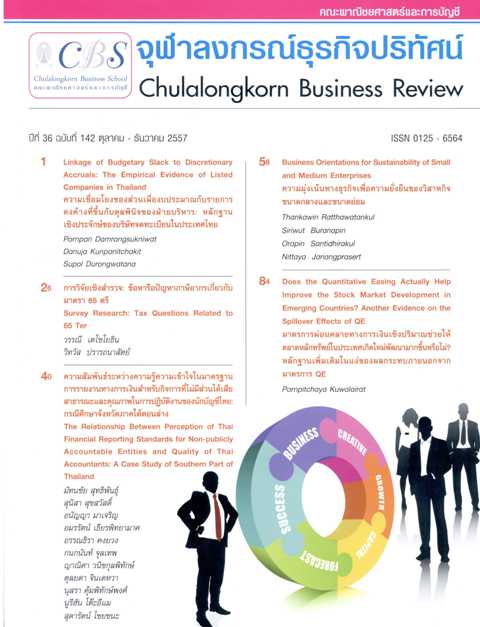Does the Quantitative Easing Actually Help Improve the Stock Market Development in Emerging Countries? Another Evidence on the Spillover Effects of QE
Main Article Content
Abstract
บทคัดย่อ
มาตรการผ่อนคลายทางการเงินเชิงปริมาณ (QE) ถูกนำมาใช้โดยธนาคารกลางของประเทศที่พัฒนาแล้วเพื่อกระตุ้นเศรษฐกิจ เพื่อให้เศรษฐกิจหลุดพ้นจากภาวะถดถอย การดำเนินมาตรการ QE ผ่านการซื้อสินทรัพย์เสี่ยงเพิ่มเติมนอกเหนือจากการซื้อพันธบัตรรัฐบาลที่มีความเสี่ยงต่ำจะส่งผลให้ปริมาณเงินในระบบในประเทศนั้นเพิ่มสูงขึ้น อันจะช่วยกระตุ้นความต้องการสินค้าและบริการโดยรวม (Aggregate demand) รวมถึงการขยายตัวทางเศรษฐกิจในประเทศนั้นๆ อย่างไรก็ดีงานวิจัยที่ผ่านมาพบว่ามาตราผ่อนคลายทางการเงินเชิงปริมาณไม่เพียงแต่ส่งผลต่อประเทศที่ดำเนินมาตรการ QE เพียงเท่านั้น หากแต่ส่งผลกระทบต่อประเทศเกิดใหม่ที่ได้รับกระแสเงินทุนไหลเข้าจำนวนมหาศาลเข้ามายังประเทศอันเป็นผลจากมาตรการ QE ด้วย ดังนั้นกระแสเงินทุนที่ไหลเข้ามาจำนวนมหาศาลยังประเทศเกิดใหม่อันเป็นผลมาจากมาตรการ QE มีแนวโน้มส่งผลทำให้ตลาดหลักทรัพย์ในประเทศเหล่านี้พัฒนามากขึ้น จากการศึกษาพบว่าตลาดหลักทรัพย์ 5 ประเทศจากทั้งหมด 11 ประเทศเกิดใหม่ในทวีปเอเชียและลาตินอเมริกามีการพัฒนาที่มากขึ้นอย่างมีนัยสำคัญในแง่ของขนาดตลาดในช่วงเวลาหลัง QE เมื่อเทียบกับช่วงเวลาก่อน QE นอกจากนี้เราพบว่าตลาดหลักทรัพย์ 6 ประเทศจากทั้งหมด 11 ประเทศ มีการพัฒนาที่มากขึ้นอย่างมีนัยสำคัญในแง่ของขนาดตลาดในช่วงเวลา QE2 เมื่อเทียบกับ QE1 ทั้งนี้ การศึกษาพบว่าสาเหตุหนึ่งที่ตลาดหลักทรัพย์ในประเทศเหล่านี้มีการพัฒนามากขึ้นเป็นผลมาจากพื้นฐานทางเศรษฐกิจของประเทศที่ดีขึ้นในช่วงเวลาที่มีมาตรการ QE จากการศึกษาพบว่าพื้นฐานทางเศรษฐกิจที่ดีเป็นปัจจัยหนึ่งที่ช่วยดึงดูดกระแสเงินทุนให้ไหลเข้ามายังประเทศเกิดใหม่และเป็นสาเหตุหนึ่งที่ส่งผลให้ตลาดหลักทรัพย์ในประเทศเกิดใหม่มีการพัฒนามากขึ้น โดยสรุปการศึกษาพบว่าตลาดหลักทรัพย์ในประเทศตลาดเกิดใหม่ส่วนหนึ่งมีขนาดใหญ่มากขึ้นอย่างมีนัยสำคัญหลังมาตรการ QE ถูกนำมาใช้โดยประเทศที่พัฒนาแล้ว ดังนั้นการศึกษาชิ้นนี้เปิดมุมมองใหม่ในแง่ของผลกระทบของมาตรการ QE ต่อการพัฒนาตลาดหลักทรัพย์ที่ยังไม่เคยมีใครกล่าวถึงมาก่อน
คำสำคัญ: มาตรการผ่อนคลายทางการเงินเชิงปริมาณ ผลกระทบภายนอก การไหลเวียนของเงินทุน การพัฒนาตลาดหลักทรัพย์
Abstract
The Quantitative Easing (QE) has been used by central banks in developed countries to help revive the economic growth and pull the countries out of recession. Through the large scale asset purchases that can involve the riskier assets in addition to usual low risk government bonds, this process will increase the money supply and therefore help stimulate the aggregate demand and economic growth in the country that has implemented the QE. However, previous literatures have found that QE does not only affect the country that implemented the QE but also has spillover effects to emerging countries that have received massive amount of capital inflows as a result of QE. As a results of these massive amount of capital inflows after the QE, we expect that QE is likely to positively affect the stock market development in emerging countries. Out of total of eleven countries in emerging Asia and emerging Latin America, we find five countries have significant higher degree of stock market development in terms of size after the QE is implemented comparing to before QE period. We also find that six out of eleven countries have significant higher degree of stock market development in term of size in QE2 period comparing to QE1. One of the reasons that the stock market development in these emerging countries are more developed is due to their economic fundamentals have been improved after the QE is implemented. We find the stronger economic fundamentals in these countries are one of the reason that helps attract the capital inflows which further result in higher degree of stock market development. In summary, we find the stock market in some of emerging market economies become larger after the implementation of the QE by advanced economy. Therefore, our paper sheds a new light in terms of another possible spillover effects of QE in terms of stock market development in emerging countries that no one has ever mentioned before.
Keywords: Quantitative Easing, Spillover Effects, Capital Flows, Stock Market Development
Article Details
Opinions and discussions in papers published by the Creative Business and Sustainability Journal (CBSJ) are deemed as personal opinions and the responsibility of the writers. They are not the opinions or responsibility of the Chulalongkorn Business School of Chulalongkorn University.
Papers, content, information etc. appearing in the Journal are deemed to be the copyright property of the Chulalongkorn Business School of Chulalongkorn University. Anybody or any organization that wishes to publish any part of them or use them in any way must obtain written permission from the Chulalongkorn Business School, Chulalongkorn University.


